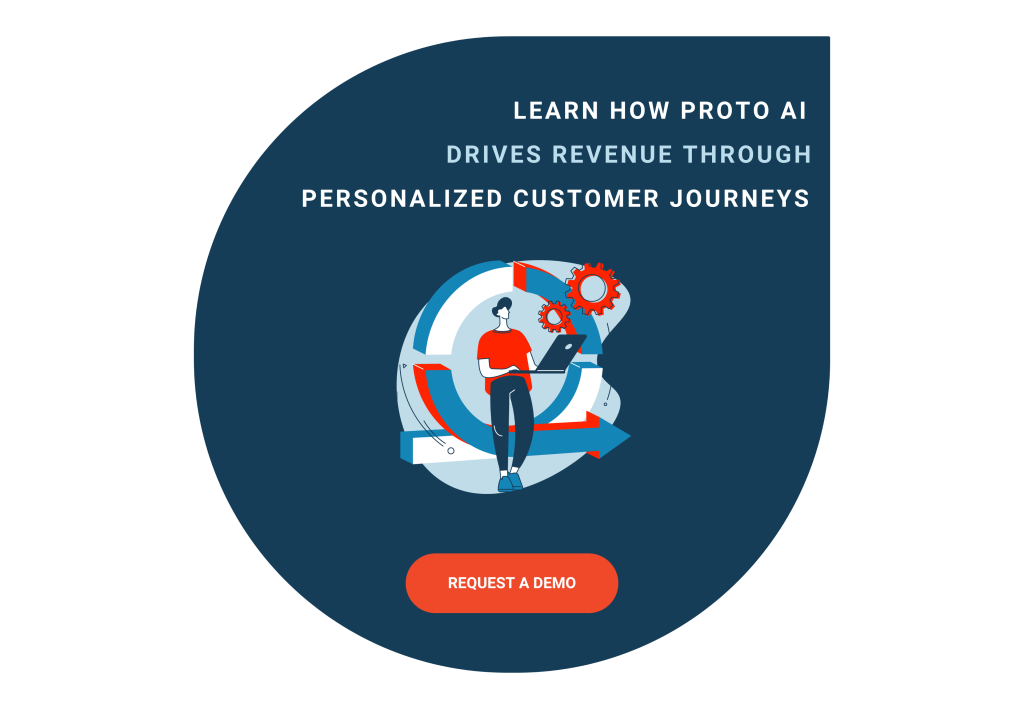Let’s say you’re the owner of an ecommerce business in the US. Your online store is fully stocked with the latest products and a well-planned marketing strategy. But there’s still something missing… That’s where AI comes in (especially as an e-commerce solution!).
By utilizing artificial intelligence, you can take the online shopping experience of your business to new heights and leave your competitors behind. Exploring AI-powered technologies that are revolutionizing ecommerce, such as virtual assistants, predictive analytics, and more, is crucial if you want to stay ahead of the game and provide your customers with a tailored shopping experience. Time to dive into all the possibilities of AI.
Revolutionizing online shopping with AI-powered visual search
Thanks to AI-powered visual search tools, online shopping has never been easier or more engaging.
With image recognition technology, customers can quickly and accurately identify products, eliminating the need for tedious keyword searches. Shoppers can take advantage of AI-driven visual search to easily find what they’re looking for and explore exciting new possibilities.
How image recognition technology works
By analyzing images and identifying items within them, AI-driven visual search provides fast and accurate product suggestions. It’s as easy as just snapping a pic of something you like and letting the tech do its job.
The power of personalized recommendations
Generic product suggestions are a thing of the past — AI algorithms tailor recommendations to each user’s unique preferences and taste. In fact, studies show that personalized experiences in ecommerce lead to higher customer satisfaction rates, increased engagement, and ultimately more conversions. Why not give it a try and see how it can benefit your online store? For more details on how to AI-powered product recommendations tackle challenges of preference to deliver highly personalized customer journeys, check out this article.
Virtual assistants for personalized shopping experiences
A shopping experience that’s tailored just for you, with the help of AI-powered virtual assistants. LG’s software integration in smartphones is a prime example of this innovation at work, with their virtual assistant offering personalized recommendations based on your preferences and behavior, making online shopping more enjoyable and efficient than ever before. Not only smartphones, but virtual assistants are also being incorporated into smart home appliances, wearables and even cars to provide AI-driven personalization for a more enjoyable customer experience.
Benefits of integrating virtual assistants into ecommerce platforms
- Boost customer satisfaction by understanding individual preferences and offering relevant product suggestions accordingly.
- Create a more engaging user experience through conversational interfaces that feel like interacting with a human salesperson rather than navigating traditional menus or search bars.
- Achieve higher conversion rates as customers find it easier to discover and purchase products they genuinely want or need.
- Save time for both customers and support teams by automating routine tasks such as order tracking, product recommendations, and frequently asked questions.
Omni-channel retailing advancements
AI is revolutionizing the retail industry by creating a seamless shopping experience across all touchpoints.
Thanks to AI-powered inventory management, businesses can maintain optimal stock levels, saving money and improving efficiency. Using AI-driven data analysis, businesses can personalize marketing campaigns to meet customer demands.
Demand forecasting models powered by AI
Machine learning techniques accurately predict future sales trends, helping businesses make informed decisions about pricing and inventory management. By analyzing historical sales data and external factors, machine learning algorithms provide actionable insights into consumer behavior patterns.
Warehouse optimization using machine learning techniques
AI-driven warehouse optimization solutions streamline operations and reduce costs associated with labor-intensive tasks. AI-driven solutions can detect impediments and lack of efficiency in the supply chain, allowing companies to take action on them beforehand. By embracing AI-driven omni-channel retailing advancements, ecommerce businesses can provide a personalized shopping experience for customers across all channels.
Chatbots: The future of customer support
Introducing chatbots powered by AI has revolutionized ecommerce customer support services.
These bots work 24/7, providing personalized responses to customers in record time.
Reducing response time with automated conversations
Gone are the days of waiting on hold or sifting through FAQs. AI-powered chatbots can handle multiple conversations simultaneously, significantly reducing response times and enhancing overall customer satisfaction.
Increasing efficiency with Natural Language Processing (NLP)
NLP enables chatbots to understand user inquiries better and provide more accurate answers based on context clues within their questions. This technology ensures seamless interactions between users and businesses while saving valuable resources that would otherwise be spent on manual support efforts.
Actionable tips:
- Select a reliable AI-chatbot platform
- Incorporate your brand’s tone of voice into your bot’s script to maintain consistency across all communication channels.
- Analyze collected data from customer interactions regularly to identify areas where improvements can be made.
- Ensure your chatbot is equipped to handle a wide range of inquiries, including frequently asked questions and complex problem-solving scenarios.
By implementing AI-driven chatbots into your ecommerce customer support strategy, you’ll enhance user experience while optimizing resources and boosting overall efficiency.
Predictive analytics: The game-changer for ecommerce sales
AI-driven predictive analytics is a game-changer in the ecommerce world, helping businesses make informed decisions on pricing strategies, inventory management, and marketing campaigns. By accurately forecasting sales trends, ecommerce platforms can plan their resources more effectively and avoid potential pitfalls caused by unforeseen market fluctuations. Machine learning techniques enable businesses to analyze historical data and identify patterns that help predict future sales performance. Dynamic pricing strategies, powered by AI algorithms, adjust product prices in real-time based on demand predictions derived from user behavior analysis and market conditions, maximizing profits while maintaining customer satisfaction through competitive pricing options tailored specifically for each shopper’s preferences and needs.
AI-driven Product recommendations: Boosting conversions and customer satisfaction
Personalized product recommendations are a game-changer in the ecommerce world, thanks to AI algorithms that analyze user browsing history, preferences, and behavior. McKinsey research shows that personalization can reduce acquisition costs by up to 50%, lift revenues by 5-15%, and increase marketing spend efficiency by up to 30%. So how do these AI-powered recommendation engines work?
Collaborative filtering for tailored suggestions
One popular technique is collaborative filtering, which uses data from similar users to make personalized suggestions. This method comes in two flavors: user-based (finding like-minded customers) and item-based (identifying products frequently bought together).
Cross-selling and upselling opportunities
Beyond just suggesting relevant items, AI-driven recommendations also create opportunities for cross-selling (encouraging customers to buy related products) and upselling (promoting higher-priced alternatives).
Forbes reports that successful upsells can boost average order value by as much as 25%.
Maximizing benefits with real-time data analysis
Proto AI takes it a step further by relying on real-time user behavior to determine decisions, ensuring that recommendations are always up-to-date and relevant. This translates into an enhanced shopping experience for customers and increased likelihood of conversions for businesses.
Getting started with AI-driven product recommendations
To harness the power of artificial intelligence in your ecommerce platform, consider integrating Proto AI or other AI-powered solutions. Remember: personalization is key to winning over today’s savvy online shoppers.
— Article Continues Below —
AI-powered Marketing Automation: A game changer for ecommerce businesses
Ecommerce businesses can now target their audience with precision. With AI-powered marketing automation, you can create campaigns that resonate with customers and optimize ad spend.
Automated email marketing:
Say goodbye to generic emails and hello to personalized campaigns tailored to individual user preferences and behavior patterns with marketing automation software.
Behavioral targeting:
AI-driven behavioral targeting ensures your message reaches the right people at the right moment, maximizing ROI on your marketing efforts.
Tips for implementing AI-powered marketing automation in your ecommerce business
- Analyze customer data from various sources to identify patterns and trends, and tailor your messaging accordingly.
- Select an appropriate marketing automation platform that supports AI capabilities, such as HubSpot or Salesforce Marketing Cloud.
- Keep an eye on the outcomes of your AI-driven advertising efforts and refine your plans through A/B testing.
By embracing AI-powered marketing automation, you’ll be able to deliver highly personalized experiences that keep customers coming back for more.
Revolutionizing ecommerce with hands-free shopping: Voice commerce integration
As voice assistants like Amazon Alexa and Google Assistant gain popularity, ecommerce platforms are embracing voice commerce capabilities. Customers can now search for products, make purchases, or track orders using natural language commands – all without lifting a finger.
Speech recognition technology:
Voice commerce relies on advanced speech recognition systems that accurately interpret user commands and provide relevant results, enhancing the overall shopping experience.
Conversational interfaces:
By incorporating conversational interfaces into their platforms, businesses can create a more engaging and interactive customer journey, allowing users to interact with ecommerce sites in a way that feels natural and intuitive.
Benefits of integrating voice commerce into your ecommerce platform
- Better customer engagement: Offering hands-free shopping options makes your platform stand out from competitors while fostering loyalty among existing customers who appreciate the convenience of voice interactions.
- Inclusivity: Voice commerce helps cater to individuals with disabilities or limited mobility by providing an alternative means of browsing online stores and completing transactions effortlessly.
- Faster conversions: The ease-of-use provided by voice commands may lead to quicker decision-making processes for consumers, resulting in increased sales opportunities for your business.
- New marketing possibilities: Voice commerce opens up new avenues for voice search optimization, enabling businesses to tap into this growing market and reach potential customers in innovative ways.
AI-driven inventory management: Optimizing stock levels efficiently
Artificial intelligence is revolutionizing inventory management in ecommerce, enabling businesses to optimize stock levels like never before. By utilizing AI algorithms, overstocking and understocking situations can be prevented, leading to improved operational efficiency and cost savings.
- Demand forecasting models powered by AI: These models analyze historical sales data alongside external factors such as seasonality or market trends to predict future demand accurately, helping businesses maintain optimal stock levels while minimizing the risk of lost sales or excess inventory costs.
- Warehouse optimization using machine learning techniques: Machine learning algorithms can identify inefficiencies in warehouse operations and suggest improvements for better space utilization and streamlined processes, resulting in faster order fulfillment times and reduced labor costs. Additionally, AI-powered tools can help monitor supplier performance metrics more effectively, ensuring timely deliveries while reducing the likelihood of supply chain disruptions that could impact customer satisfaction negatively.
AI for the digital business
AI solutions have transformed the digital business landscape, providing customers with personalized shopping experiences through image recognition technology, virtual assistants, and chatbots. Businesses can make better sales decisions with predictive analytics and AI-driven product recommendations, while marketing automation tools enable targeted ads and automated email campaigns. Voice commerce integration has improved accessibility for users with conversational interfaces, and AI-powered inventory management ensures efficient warehouse optimization and accurate demand forecasting models.


